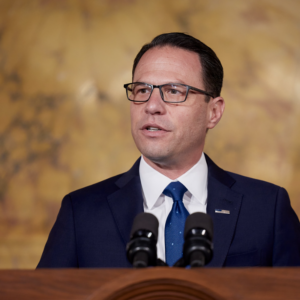According to a Commonwealth Foundation poll released Tuesday, Pennsylvania voters don’t want Gov. Josh Shapiro to push the state into the Regional Greenhouse Gas Initiative.
Shapiro appealed a court ruling last month, finding previous Democratic Gov. Tom Wolf’s 2022 executive order putting Pennsylvania in the RGGI multi-state carbon credit program created an “invalid tax.” Shapiro appears dead set on appealing the ruling, with his spokesperson saying the administration “must appeal in order to protect that important authority for this administration and all future governors.”
The Commonwealth Foundation poll found that 71 percent of the 800 registered Pennsylvania voters surveyed opposed giving the governor power to “unilaterally impose new taxes” without the state legislature first approving it.
However, the survey also found that 72 percent hadn’t read, seen, or heard about RGGI. That wasn’t a shock to Commonwealth Foundation Media and Public Relations Director Christian Stellakis.
“RGGI lacks transparency, so it’s no surprise that many Pennsylvanians aren’t familiar with it,” Stellakis told DVJournal while mentioning that the RGGI program itself is hard to understand. “But voters overwhelmingly oppose a new energy tax leading to a 30 percent increase in their home utility bills—which is precisely what RGGI would create.”
EnergySage said Pennsylvania residents spend around $2,592 annually on electricity – 24 percent higher than the national average. That grows to $3,369 with the RGGI 30 percent increase factored in.
Commonwealth Foundation reported that 63 percent of those surveyed don’t want the state to be part of the carbon cap and invest program if new taxes on energy are imposed. A total of 60 percent said they were less likely to support RGGI if it meant Pennsylvania’s economy would suffer more than 22,000 job losses along with a $7.7 billion yearly economic loss.
“Voters don’t want an energy tax,” said Nate Benefield, senior vice president of the Commonwealth Foundation. “In fact, voters agreed with candidate Shapiro, who campaigned saying he was concerned about RGGI and the implications that it would have on the costs imposed by RGGI.”
Wolf made the RGGI pact a top priority for his administration. He ordered the state Department of Environmental Protection (DEP) and the Environmental Quality Board (EQB) to assemble an RGGI package instead of going through the legislative process. He also vetoed a bill that would have required the legislature’s approval to enter RGGI.
Those efforts were stymied last year by the Commonwealth Court after an injunction. A bipartisan group of judges struck down RGGI last month. They argued that the only way for RGGI to “pass constitutional muster, the Commonwealth’s participation in RGGI may only be achieved through legislation duly enacted by the Pennsylvania General Assembly.”
Pennsylvania ran into other headaches regarding RGGI. Business groups filed lawsuits over the planned regulations. A working panel put together by Shapiro’s administration did not endorse RGGI as a solution in September.
Republican Leader in the Pennsylvania House of Representatives, Rep. Bryan Cutler, wrote in DVJournal that the Commonwealth Court made the right move regarding the state’s entry into RGGI because it expanded executive authority too much. He added that Pennsylvanians also understand there is a process the state needs to go through before policy becomes law. “These efforts also led to the largest reassertion of legislative authority in recent history when we put before voters constitutional amendments that were ultimately approved limiting the governor’s unilateral authority during emergencies.”
Click here to read the full poll.

